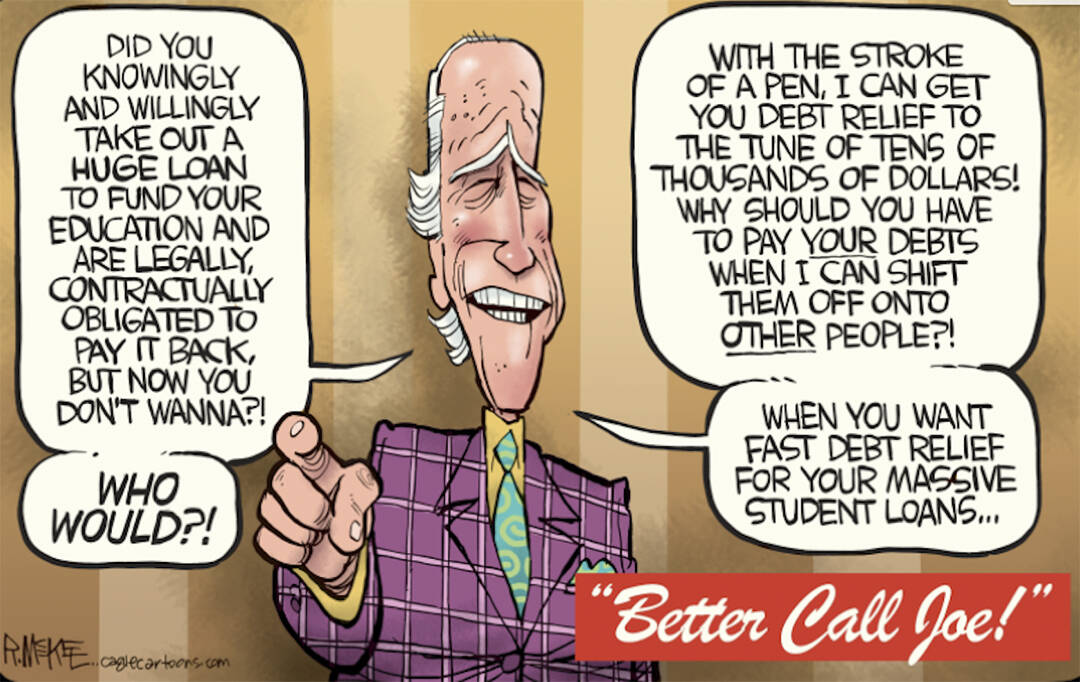My roots are blue. Not the political blue of the current climate. Blue-collar blue. My maternal grandfather had a third-grade education and spent almost three decades picking up trash for the city of Philadelphia. Neither of my four grandparents went to college, and only one of them finished high school. My mother was the first in her family to obtain a high school diploma.
And then there was my father. He excelled in high school, so they knew he had a brain. But Teddy had no money, so he went into the army for a few years, cooling his heels (literally) at a NORAD post in Greenland. When he came home, he used money from the GI Bill as well as money from the many jobs he juggled to get an undergraduate degree at the University of Maryland. He never asked for help, beyond what the government owed because of his military service. If he had, he would have made sure to pay back whatever was loaned, with interest.
I was thinking about my father and grandparents when I heard about the Inflation Expansion Act recently announced by President Biden. You might know it by its official name, student loan debt forgiveness. But when you look at the details, it essentially becomes a wealth-shifting formula where middle- and lower-income families will foot the additional bill for students who won’t fulfill their financial obligations.
When I posted on social media that no one’s debt should be waived until everyone who actually paid back their student loans is made whole (I called it “Non-Grifter Reparations,”) a lot of the response was positive. Apparently, many of us are incensed by what appears to be a reward for shirking responsibility. Others disagreed vehemently and put the blame on the predatory lenders and the colleges with their bloated endowments.
And to be fair, they’re all responsible for the mess. But it’s completely naïve to just excuse these students who willingly and with full disclosure signed on for the loans. They or their parents were fully aware of the consequences of the agreement, and no one forced them to sign on the dotted line. Anyone who suggests that they were placed in an untenable position has no idea what that even looks like. My father did. Many other fathers, mothers and grandparents did too.
I’m not an economist, but the ones I’ve spoken to are convinced that the program is both too much and too little. It will shift billions of dollars of debt forgiveness onto middle-class taxpayers while making an insignificant dent in the debt of most American students. We hurt the many, to (barely) help the few.
And even though I’m a lawyer and know something about the constitutionality of executive orders in the immigration context, I’m not going to predict the legality of this move. It will be up to the courts to decide if Biden exceeded his executive authority.
The thing that angers me is the absolute immorality of telling one group of people that they get to keep something they didn’t pay for. Unlike bankruptcy where you generally lose the property you can’t afford, no one can take that degree away from you.
Another thing that really angers me about this whole scheme is that it does little to nothing to encourage young people to enter the trades, honorable professions that get short shrift by high school counselors and the public at large. If we’re going to fund education, I’d rather subsidize a future carpenter than contribute to the brain-massaging of an Ecogastronomy major.
My father, and the people like him, took their obligations seriously. They weren’t victims and didn’t whine about entitlements. Biden, who came from my father’s generation and pretends to be like him, is ignoring the singular American virtue that characterized that group: accountability.
To paraphrase someone important: “What profit a president to win some votes, but lose his soul?”
Copyright 2022 Christine Flowers, distributed exclusively by Cagle Cartoons newspaper syndicate. Flowers is an attorney and a columnist and can be reached at cflowers1961@gmail.com.



